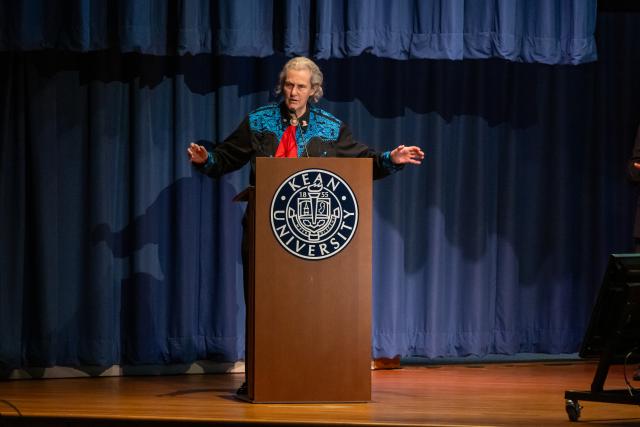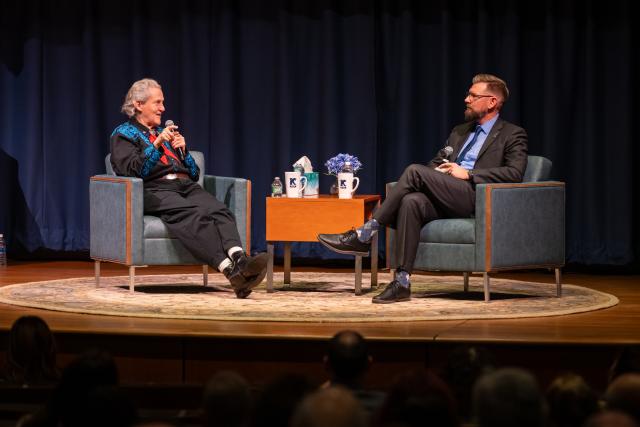Distinguished Lecturer Temple Grandin, Ph.D., Shares Insight on Educating Students with Autism at Kean University

Teaching hands-on skills and letting children learn from mistakes will help position autistic students for success, renowned autism advocate Temple Grandin, Ph.D., told an audience last week at Kean University.
Known for both her leadership in the autism community and her work as an animal scientist, Grandin shared her message, The World Needs All Kinds of Minds, in the Kean University President’s Distinguished Lecture Series.
“I’m trying to bust up the autism box,” Grandin said. “I want to see young people who think differently get out there and be successful. Kids are afraid of failing. But you learn from mistakes.”
Kean President Lamont O. Repollet, Ed.D., gave Grandin a warm welcome to the state’s urban research university.
“At Kean, diverse perspectives are welcome and celebrated,” Repollet said. “Temple Grandin’s advocacy and groundbreaking work embody the transformative power of inclusion. She reminds us that diversity includes neurodiversity.”
Kean’s President’s Distinguished Lecture Series invites newsmakers and experts to share their expertise with the Kean community. The Grandin lecture drew a full house, including many attendees with disabilities and sensory needs.
The event was supported by Kean alumna Marjorie Slass ’13 M.A., ’16 Psy.D. and her husband, Jonathan Slass, who have a daughter on the autism spectrum.

“She is the inspiration for why we want to fund autism education,” Marjorie Slass said. “We’re thrilled to be part of this.”
A professor of animal science at Colorado State University and author of numerous books, Grandin was diagnosed with autism as a young child. She learned to speak at age 4 through the benefit of education, speech therapy and encouragement. She spent many childhood summers on a family ranch and became a leader in improving the livestock industry. Her life story was told in an HBO movie.
Plainspoken and charming, Grandin opened her lecture by saying she wanted to discuss “things that are nice and practical.”
“We need the skills of people who think differently,” she said. “The first step is learning that different kinds of thinking exist.”
She defined three different ways of thinking: Visual thinking, or thinking in pictures; spatial visualization, or thinking in patterns; and verbal thinking, or thinking in words.
Grandin also listed strategies for educators to support students with diverse ways of thinking, including encouraging “tinkering” and the exploration of different trades, providing opportunities for children to work outside the home early—such as volunteer jobs—to build skills and set expectations, and connecting them with mentors to guide their development.
Children should be exposed to a broad range of experiences to help them discover their interests and strengths, she said.
“You’ve got to get out and try stuff,” Grandin said. “I believe in trying on careers. It’s important to find out what you hate.”
Grandin also took part in a question-and-answer session moderated by James Konopack, Ph.D., dean of the Kean University College of Health Professions and Human Services (CHPHS).
He noted that her work matches the goals of CHPHS. “Our mission is to prepare future professionals to provide culturally responsive, holistic, evidence-based care,” he said.
For many in the audience, Grandin’s message struck a chord.
“She was fantastic. So personable, such a different way to see things,” said Aaron Gubi, Ph.D., an assistant professor in Kean’s Department of Advanced Studies in Psychology. “I think her message is we need to be flexible and give neurodiverse thinkers different ways to use their skills.”
Kean junior Sierra Ramirez of North Brunswick, a student in the College of Education who plans to go into special education, said she saw the movie about Grandin’s life and came to the lecture to learn more.
“I’m right now in classrooms working with children with autism. Hearing her advice and stuff was really an eye-opener, like what I could do better,” Ramirez said. “Don’t over-protect kids, give them space to tinker.”
Grandin’s message also resonated with Charles Garrett of New Providence, a Kean sophomore majoring in recreational therapy. He currently works at an occupational therapy clinic with children on the autism spectrum.
“It really gave me some insight into how some of them might be thinking, and what different therapeutic approaches might be more effective,” he said.
The President’s Distinguished Lecture Series will include appearances by actor Giancarlo Esposito, on Tuesday, February 4, 2025, and technology journalist Kara Swisher, on Monday, April 28, 2025. More information is available here.